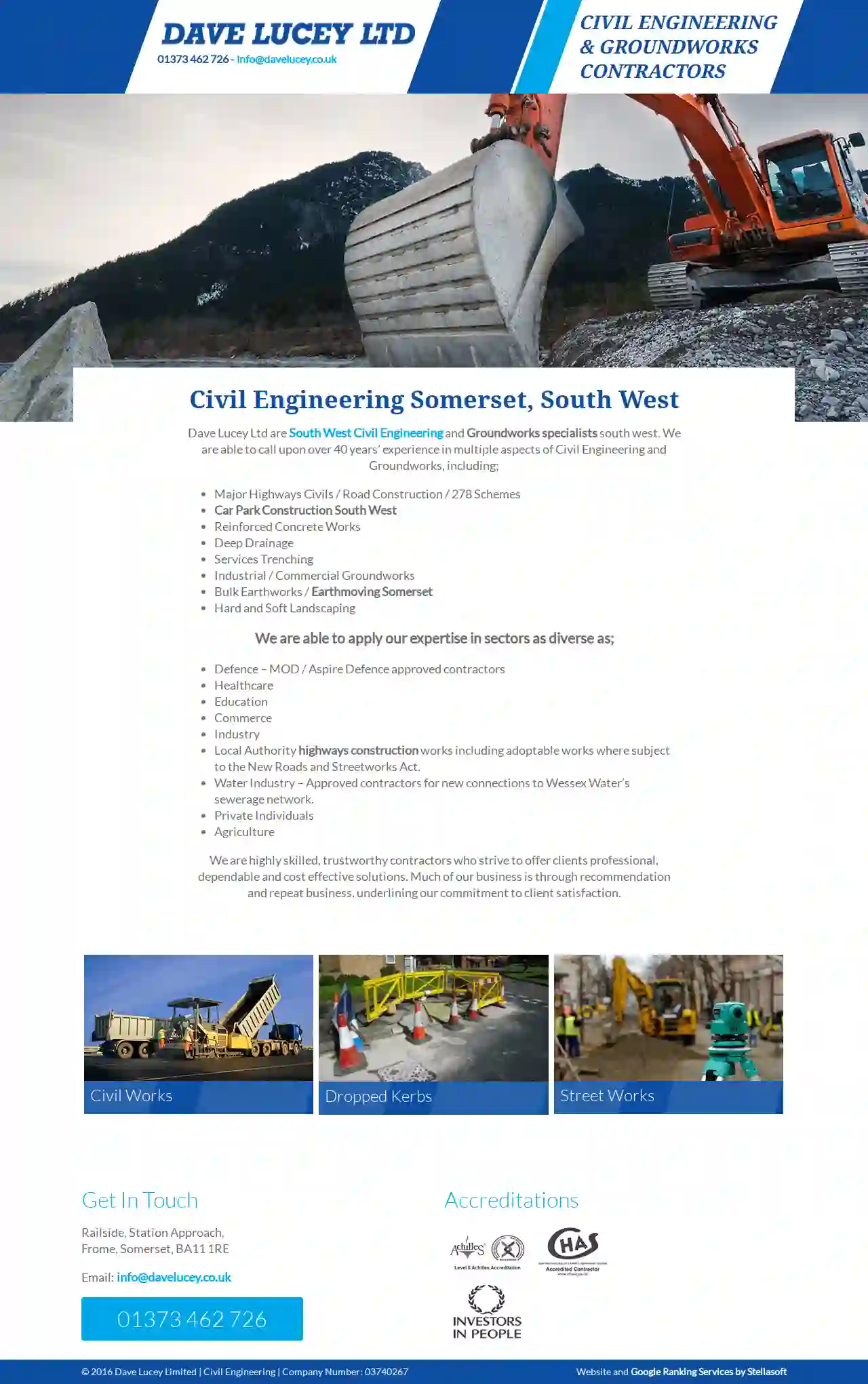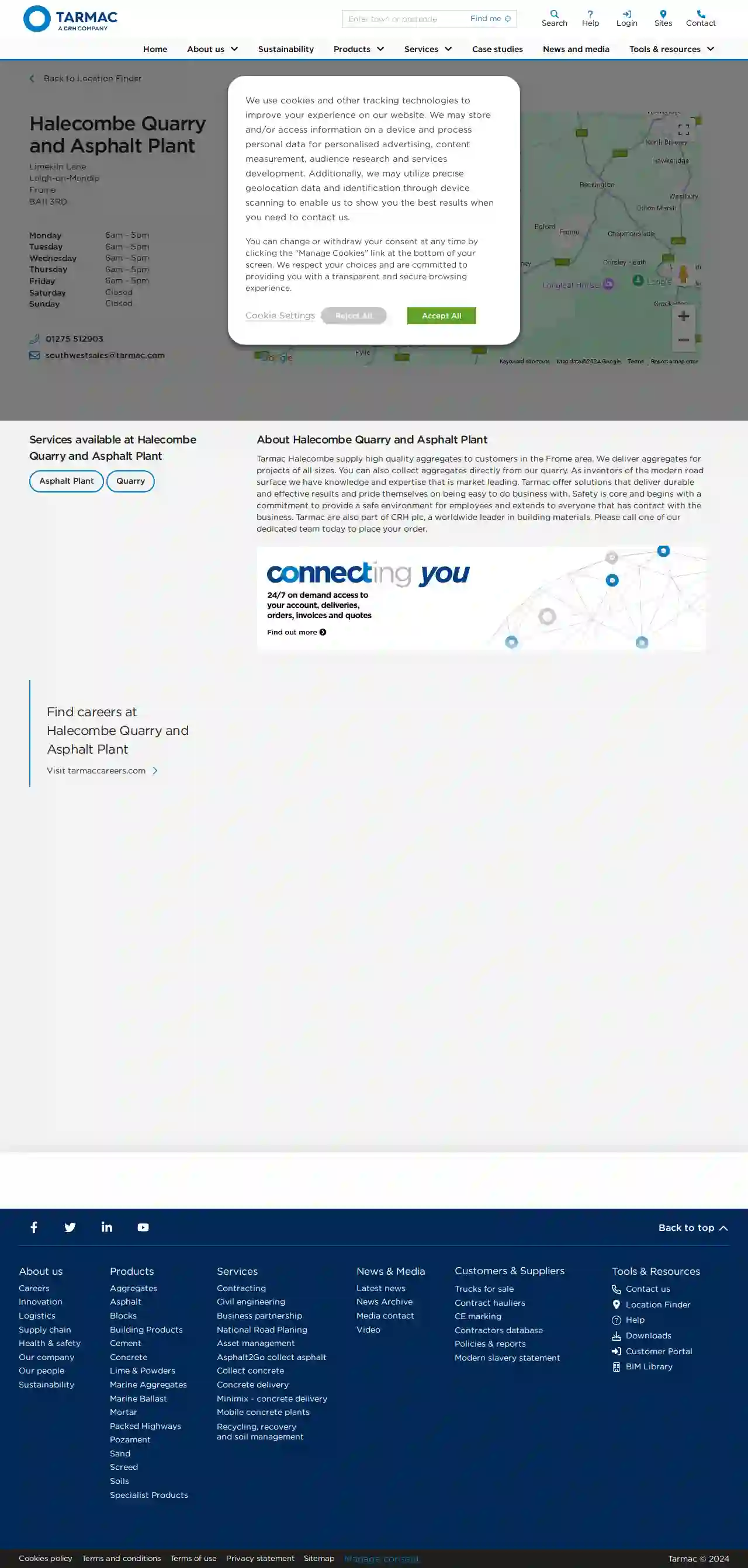Demolition Contractors Frome
Best Structure Demolition in Frome
Get 3 FREE Structure Demolition quotes for your project today! Compare profiles, reviews, accreditations, portfolio, etc... and choose the best deal.

Dave Lucey Ltd
53 reviewsRailside, Station Approach, Frome, Somerset, BA11 1RE, GBDave Lucey Ltd: Your Trusted Civil Engineering and Groundworks Partner in the South West With over 40 years of experience, Dave Lucey Ltd has established itself as a leading provider of civil engineering and groundworks services in Somerset and the wider South West region. We are a team of highly skilled and dedicated professionals committed to delivering exceptional results for our clients. Our expertise spans a wide range of projects, including: Major Highways Civils / Road Construction / 278 Schemes Car Park Construction Reinforced Concrete Works Deep Drainage Services Trenching Industrial / Commercial Groundworks Bulk Earthworks / Earthmoving Hard and Soft Landscaping We have a proven track record of success in diverse sectors, including: Defence – MOD / Aspire Defence approved contractors Healthcare Education Commerce Industry Local Authority highways construction works including adoptable works where subject to the New Roads and Streetworks Act Water Industry – Approved contractors for new connections to Wessex Water’s sewerage network Private Individuals Agriculture Our commitment to client satisfaction is evident in our high volume of repeat business and referrals. We strive to provide professional, dependable, and cost-effective solutions for every project.
- Services
- Why Us?
- Gallery
Get Quote- JW
JW Ransome & Sons
4.848 reviewsFrome, GB- Services
- Why Us?
Get Quote - M
M K R Construction Projects Ltd
2.110 reviewsFrome, GB- Services
- Why Us?
Get Quote 
Craftbuild Building Services Ltd
1Frome, GBCraftbuild: Your Trusted Partner for Quality Construction At Craftbuild, we believe in delivering exceptional quality as standard. With over 30 years of combined experience, our team is equipped to handle a wide range of construction projects, from extensions and kitchens to roof construction and landscaping. We pride ourselves on our commitment to excellence, evident in the high-quality work we consistently deliver. Explore our Gallery to see a diverse collection of our recent projects, showcasing the meticulous attention to detail and craftsmanship that defines our work. We regularly update our Gallery with new projects, so be sure to check back for the latest additions. We offer free quotations for all projects. Contact us today to discuss your construction needs and let us help you bring your vision to life.
- Services
- Why Us?
- Gallery
Get Quote- Aq
Aquarius building conservation
1Frome, GB- Services
- Why Us?
Get Quote - Fl
Flower's Construction
55 reviewsFrome, GB- Services
- Why Us?
Get Quote - J
J C Civils and construction
56 reviewsFrome, GB- Services
- Why Us?
Get Quote - Ad
Advanced Mini Piling Systems
53 reviewsFrome, GB- Services
- Why Us?
Get Quote - A
A & R Contracting
1Frome, GB- Services
- Why Us?
Get Quote 
Tarmac Halecombe Quarry and Asphalt Plant
4.73 reviewsFrome, GB- Services
- Why Us?
- Gallery
Get Quote
Over 11,537+ Excavation Companies onboarded
Our excavation providers operate in Frome & surrounding areas!
ExcavationHQ has curated and vetted Top Excavation Companies in and around Frome. Find a top & reliable contractor today.
Frequently Asked Questions About Demolition Contractors
- Dust Suppression: Use water spraying, misting systems, or other dust suppression techniques to control airborne particles.
- Noise Barriers: Erect temporary noise barriers around the demolition site to reduce noise transmission to nearby properties.
- Work Schedule: Schedule noisy demolition activities during permitted hours to minimize disturbance to neighbors.
- Communication: Keep neighbors informed about the demolition schedule and any potential disruptions.
- Recycling: Concrete, brick, metal, and wood can be recycled and reused in other construction projects, reducing waste sent to landfills.
- Landfill Disposal: Non-recyclable materials are disposed of in designated landfills according to local regulations.
- Donation: Some materials, such as fixtures or appliances, may be suitable for donation to charitable organizations.
- Waste Generation: Demolition generates a large volume of debris, contributing to landfill space and potentially releasing harmful substances into the environment if not disposed of properly.
- Air Pollution: Dust and particulate matter released during demolition can impact air quality, affecting human health and the environment.
- Noise Pollution: Demolition activities can generate significant noise, disturbing nearby residents and wildlife.
- Resource Depletion: Demolition consumes resources that could be salvaged and reused, contributing to resource depletion and environmental degradation.
What is the difference between demolition and deconstruction?
Demolition: Typically involves bringing down a structure quickly and efficiently, often using heavy machinery and potentially explosives. The primary goal is to clear the site.
Deconstruction: Focuses on carefully dismantling a building piece by piece to salvage reusable materials. It prioritizes minimizing waste and environmental impact, often involving manual labor and specialized tools.
The choice between demolition and deconstruction depends on the project's objectives, budget, and environmental considerations.
How can I minimize the dust and noise from demolition?
What happens to the debris after demolition?
What are the environmental impacts of demolition?
What is the difference between demolition and deconstruction?
Demolition: Typically involves bringing down a structure quickly and efficiently, often using heavy machinery and potentially explosives. The primary goal is to clear the site.
Deconstruction: Focuses on carefully dismantling a building piece by piece to salvage reusable materials. It prioritizes minimizing waste and environmental impact, often involving manual labor and specialized tools.
The choice between demolition and deconstruction depends on the project's objectives, budget, and environmental considerations.
How can I minimize the dust and noise from demolition?
- Dust Suppression: Use water spraying, misting systems, or other dust suppression techniques to control airborne particles.
- Noise Barriers: Erect temporary noise barriers around the demolition site to reduce noise transmission to nearby properties.
- Work Schedule: Schedule noisy demolition activities during permitted hours to minimize disturbance to neighbors.
- Communication: Keep neighbors informed about the demolition schedule and any potential disruptions.
What happens to the debris after demolition?
- Recycling: Concrete, brick, metal, and wood can be recycled and reused in other construction projects, reducing waste sent to landfills.
- Landfill Disposal: Non-recyclable materials are disposed of in designated landfills according to local regulations.
- Donation: Some materials, such as fixtures or appliances, may be suitable for donation to charitable organizations.
What are the environmental impacts of demolition?
- Waste Generation: Demolition generates a large volume of debris, contributing to landfill space and potentially releasing harmful substances into the environment if not disposed of properly.
- Air Pollution: Dust and particulate matter released during demolition can impact air quality, affecting human health and the environment.
- Noise Pollution: Demolition activities can generate significant noise, disturbing nearby residents and wildlife.
- Resource Depletion: Demolition consumes resources that could be salvaged and reused, contributing to resource depletion and environmental degradation.